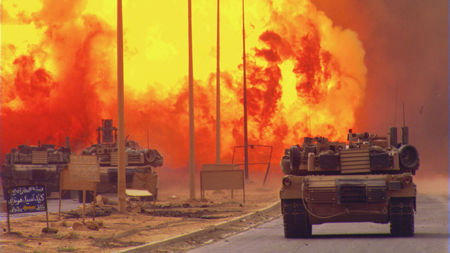|
Reviews of Recent Independent, Foreign, & Documentary Films in Theaters and DVD/Home Video
Directed by: Charles Ferguson. Produced by: Mr. Ferguson, Jennie Amias & Jessie Vogelson. Director of Photography: Antonio Rossi. Edited by: Chad Beck & Cindy Lee. Music by: Peter Nashel. Released by: Magnolia Pictures. Country of Origin: USA. 102 min. Not Rated. Narrated by: Campbell Scott. Of all the recent Iraq War documentaries, No End in Sight is the one to most strongly emphasize the clash between the military and the Bush Administration during the first months of the U.S. occupation of Iraq. In a cutting debate between two talking heads, an indignant and reddening Col. Paul Hughes claims the military was never consulted in the key decision to disband Iraq’s standing army, a charge denied – at first – by a stammering, gulping Walter Slocombe, senior advisor for national security and defense. Days after this decision, Americans were targeted by what would become the insurgency. So it’s not surprising that Presidential Envoy L. Paul Bremer, who made the order, didn’t agree to be interviewed for this film. (Both Slocombe and Bremer issued this policy change before stepping foot in Iraq.) However, first-time director and Brookings Institution senior fellow Charles Ferguson has a heavy roster of insiders, including Barbara Bodine, who was in charge of Baghdad after the fall of Saddam Hussein; former Deputy Secretary of State Richard Armitage, who candidly calls Bodine “difficult”; and mild-mannered General Jay Gardner, who was hired to head postwar aid and reconstruction only eight weeks before the war began. The film reinforces much of what has already been covered in Why We Fight, Uncovered: The War on Iraq, and Gunner Palace. The larger picture presented here will likely be old news, although it will jab the memory and still will shock. Campbell Scott’s narration is dry; it’s the sound bites that sting: Secretary of Defense Donald Rumsfeld condescendingly telling a reporter that the war “is too complex for people to comprehend,” President George W. Bush erroneously declaring the end of major operations in May 2003, and, later in the film, his “Bring it on” taunt.
Ferguson focuses on the postwar planning – or lack thereof – and less so on the war’s lead-up, and ends in 2006 before the current surge, covering
the same terrain as the less confrontational Frontline episode, The Lost Year in Iraq, which deals a little more with the full-scale war
between the Departments of Defense and State. Here, Bremer appears before the camera, though not always with a firm memory. But Ferguson rigorously
makes the most of his 102 minutes, expanding on the television documentary by addressing the issue of troop levels as well as the administration’s
slow response to the rising insurgency.
Kent Turner
|

